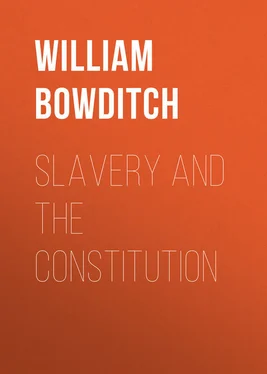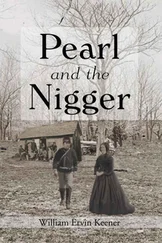William Bowditch - Slavery and the Constitution
Здесь есть возможность читать онлайн «William Bowditch - Slavery and the Constitution» — ознакомительный отрывок электронной книги совершенно бесплатно, а после прочтения отрывка купить полную версию. В некоторых случаях можно слушать аудио, скачать через торрент в формате fb2 и присутствует краткое содержание. ISBN: , Жанр: foreign_antique, foreign_prose, на английском языке. Описание произведения, (предисловие) а так же отзывы посетителей доступны на портале библиотеки ЛибКат.
- Название:Slavery and the Constitution
- Автор:
- Жанр:
- Год:неизвестен
- ISBN:http://www.gutenberg.org/ebooks/38716
- Рейтинг книги:4 / 5. Голосов: 1
-
Избранное:Добавить в избранное
- Отзывы:
-
Ваша оценка:
- 80
- 1
- 2
- 3
- 4
- 5
Slavery and the Constitution: краткое содержание, описание и аннотация
Предлагаем к чтению аннотацию, описание, краткое содержание или предисловие (зависит от того, что написал сам автор книги «Slavery and the Constitution»). Если вы не нашли необходимую информацию о книге — напишите в комментариях, мы постараемся отыскать её.
Slavery and the Constitution — читать онлайн ознакомительный отрывок
Ниже представлен текст книги, разбитый по страницам. Система сохранения места последней прочитанной страницы, позволяет с удобством читать онлайн бесплатно книгу «Slavery and the Constitution», без необходимости каждый раз заново искать на чём Вы остановились. Поставьте закладку, и сможете в любой момент перейти на страницу, на которой закончили чтение.
Интервал:
Закладка:
Slaveholding is wrong under all circumstances, because it either darkens the minds, brutalizes the souls, and deadens the affections of the slaves, or, without any necessity, renders such spiritual death not merely possible, but almost inevitable. If it is wrong to murder the body, how much more wrong is it to murder the soul! Slaveholding is murder of the soul!
CHAPTER II.
DIRECT MENTAL INSTRUCTION OF SLAVES
"It is universally the fact throughout the Slaveholding States, that either custom or law prohibits them [ i. e. the slaves] the acquisition of letters." — Report made to Synod of South Carolina and Georgia in 1833.
At a recent annual meeting of the American Colonization Society, the Rev. Joel Parker, D.D. of Philadelphia, a member of the Presbyterian Church, speaking of the instruction of the colored race, is reported to have used the following language: – "There seems to me, in connection with this subject, a beautiful illustration of what Hall calls 'a fetch in Divine Providence.' God had a design in bringing these people to this country in the way he did. We cannot probably comprehend the whole of it; but this we can see, he has secured the education of those who, to all human appearance, would not and could not have been educated in any other way. There are now in this country more than three hundred thousand Africans who can read and write, who could not have done it if it had not been for the slave-trade. There are many in this country and in Liberia who are capable of preaching the gospel, editing papers, and performing all the duties of civil life, who must have remained in total darkness but for this trade. How came this people by all this knowledge? Did anybody go to Africa and teach them? No! It has been done by slavery… And now we send them back to Africa, with a preparation for doing a great work there, which we never could have imparted to them in any other way… In this view of the subject, we may perceive at least one good which slavery has done to Africa; and the question may with propriety be asked, whether it has not done for Africa more good than harm."
If we may believe this spiritual teacher, the Being who made of one blood all the nations of men, the common Father of us all, himself designed the scheme by which millions of men, women, and children were torn from their homes and friends, and all they held dear, and brought to this country, through all the horrors of the middle passage, where a terrible death relieved on an average at least one fifth of the victims from a scarcely less terrible life, – for this end in part, that, after two centuries of wrongs, not even a tithe of their descendants might be returned to the land of their fathers, to teach the Africans the religion of their oppressors! A truly touching example of God's loving-kindness and tender mercy to all his children!
That many slaves have been instructed to the extent stated by Dr. Parker is true; but they have been educated, not in consequence, but in spite, of slavery. So hostile to mental culture is slavery, that but a slight examination is needed to satisfy us that it is neither profitable nor safe to educate a slave beyond a certain point. Without some education, a slave would be worse than valueless. Far the larger number of them, as field slaves, are simply taught to use the hoe, and other instruments of agriculture. Others are brought up as carpenters, masons, blacksmiths, house-servants, &c. Frederick Douglass earned a dollar and a half a day at caulking; whilst William Craft, as a cabinet-maker and occasional waiter at an hotel, supported himself, and paid his owner twenty dollars a month for the right to use his own muscles. We occasionally meet with such advertisements as the following, cut from the "New Orleans Picayune," of Oct. 18, 1846: —
"Credit Sale of Valuable Negro Mechanics, &c. – By Beard, Calhoun, and Co. auctioneers, will be sold at auction, on Tuesday the 20th October, at twelve o'clock, at Banks's Arcade, the following valuable slaves: – Ezekiel, 25 years, a superior carpenter , fully guarantied; Jacob, 25 years, a superior carpenter and wheelwright , fully guarantied; Dick, 35 years, a superior carpenter and wheelwright , fully guarantied; Charles, 28 years, engineer and rough carpenter ; Charles, 22 years, field hand , fully guarantied, excepting slightly ruptured; Sancho, 26 years, good house carpenter , fully guarantied; Maria, mulattress, 28 years, first-rate washer and ironer , fully guarantied; Maria, negress, 13, child's nurse, fully guarantied.
"Terms: Twelve months' credit for notes drawn and endorsed to the satisfaction of the vendor, with mortgage on the property, bearing interest eight per cent per annum, from date of sale until paid. Slaves not to be delivered until the notes are approved of. The servants can be seen on the morning of sale. Act of sale before D. I. Ricardo, notary public, at the expense of the purchaser."
In the same paper, Alexander Daggett advertises "for sale a negro man, a first-rate blacksmith ." In the "Richmond Whig" of Jan. 25, 1848, Benjamin Davis advertises for sale a negro man "who is a first-rate carpenter by trade; also a rough blacksmith." In the "Charleston (S.C.) Mercury," Thomas W. Mordecai, broker and auctioneer, under date Sept. 1, 1847, advertises at private sale —
"An uncommonly prime and likely black man, about 22.
A prime woman , a superior washer, and good cook and farm hand.
A very prime axeman and field hand.
A superior man-cook."
It is not, however, necessary to teach a slave-mechanic or field hand, or even "a prime woman," to read or write, in order to make him or her a profitable investment. If we suppose William Craft's value as a slave to have been two thousand dollars, his master received from his investment only twelve per cent clear profit ! Yet William could neither read nor write. He was a valuable working machine. To have him educated farther, to have taught him to read or write, would have lessened his market value. To teach a slave these things is to teach him his rights, and to make him keenly feel his wrongs. Mrs. Hugh Auld taught Frederick Douglass his letters before slavery had hardened her naturally kind heart. She gave him the inch, as he says, and no precaution could prevent his taking the ell. He taught himself to read and write, and thus describes the effect produced by reading a book called "The Columbian Orator." This book contains one or more of Sheridan's speeches, and a dialogue between a master and his slave, wherein the slave is made to refute all the arguments usually brought forward in support of slavery.
"The more I read," he says ("Narrative," p. 40), "the more I was led to abhor and detest my enslavers. I could regard them in no other light than a band of successful robbers, who had left their homes, and gone to Africa, and stolen us from our homes, and in a strange land reduced us to slavery. I loathed them as being the meanest as well as the most wicked of men. As I read and contemplated the subject, behold! that very discontentment which Master Hugh had predicted would follow my learning to read had already come, to torment and sting my soul to unutterable anguish. As I writhed under it, I could at times feel that learning to read had been a curse, rather than a blessing. It had given me a view of my wretched condition, without the remedy. It opened my eyes to the horrible pit, but to no ladder upon which to get out. In moments of agony, I envied my fellow-slaves for their stupidity. I have often wished myself a beast. I preferred the condition of the meanest reptile to my own, – any thing, no matter what, to get rid of thinking! It was this everlasting thinking of my condition that tormented me. There was no getting rid of it."
Читать дальшеИнтервал:
Закладка:
Похожие книги на «Slavery and the Constitution»
Представляем Вашему вниманию похожие книги на «Slavery and the Constitution» списком для выбора. Мы отобрали схожую по названию и смыслу литературу в надежде предоставить читателям больше вариантов отыскать новые, интересные, ещё непрочитанные произведения.
Обсуждение, отзывы о книге «Slavery and the Constitution» и просто собственные мнения читателей. Оставьте ваши комментарии, напишите, что Вы думаете о произведении, его смысле или главных героях. Укажите что конкретно понравилось, а что нет, и почему Вы так считаете.












